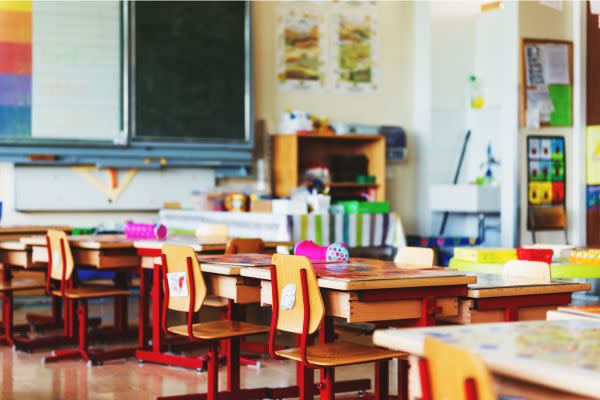It’s Back to School, and Resources are Scarce

As students are preparing to head back to school, teachers have been preparing their classrooms for the upcoming year by decorating, supplying, and writing lesson plans.
For Native teachers, the upcoming school year is nerve-wracking as they struggle to collect resources for their students. Resources are scarce–-and in Oklahoma, already stretched-thin school resources are being funneled into a new Catholic charter school.
Many K-12 teachers across Indian Country struggle to stock their classrooms with the necessary supplies needed for the school year. Things like glue, pencils, markers, paper, etc. are hard to buy due to the lack of funding. Often, these supplies come from the teachers’ own pockets. Many teachers create public Amazon wish lists so that others can donate items.
A survey done by Adopt A Classroom, a nonprofit that provides free funding to teachers across the nation, found that teachers across the U.S. spent an average of $860 in the 2022-2023 school year out of pocket on school supplies for their classrooms. At high-needs schools, teachers spent a slightly higher average of $880.
The most commonly bought items are basic supplies like paper, pencils, and notebooks. Eighty-four percent of teachers said they need basic supplies. Fifty-five percent of teachers need books and inclusive/adaptive materials. Forty-four percent of teachers said they need technology. Forty-three percent of teachers need furniture, which can include fundamental items like desks or wobble stools to help their students stay focused.
Teachers are not only struggling to keep their classrooms stocked with essentials; they are also fighting to keep education equitable and unbiased.
Yet, in Oklahoma, St. Isidore of Seville Catholic Virtual School was approved as the nation’s first publicly-funded religious charter school in June.
The Oklahoma Statewide Virtual Charter School Board approved the school in a 3-to-2 vote despite concerns raised by its legal counsel. The board is made up of appointees by Governor Kevin Stitt, a Republican who supports religious charter schools, and leaders of the Republican-controlled State Legislature.
Now that the school is approved, taxpayer dollars would go to fund a school that uses sectarian values and religious-centered education, diverting funds away from Oklahoma public schools, already ranking near the bottom of the country in education spending.
In its charter school application, St. Isidore plans to “provide Christ-centered Catholic formation” and will function “as a genuine instrument of the church” as a place of “evangelization.”
A second-grade teacher starting her first year of teaching, a citizen of the Citizen Band Potawatomi Nation, says she relies on the Johnson-O’Malley Program, an organization that provides funding for supplemental programs through contracts with public schools within the Choctaw Nation service area, to stock her classroom.
She emphasizes that teachers “are not trying to indoctrinate children. We are trying to teach children. We want them to grow up and think for themselves and be who they are.” The teacher asked to remain anonymous due to the fear of retaliation and that her teaching license would be withheld.
“Education is for the public good. It's a social necessity. Yes, parents should have some choice in their children's education, but if it's being provided by the public, then it needs to be for the public good,” she explains.
She ties the need for education to be created equitably and fairly to the Seven Generations teaching in many Native communities, the belief that the things we do now should be to nurture the seven generations in the future.
The Republican State Superintendent Ryan Walters has endorsed recommendations to hang the Ten Commandments in every public school classroom and requires that students be given a full minute before school for prayer or silent reflection, to teach the Bible, and to train all history teachers in Oklahoma public schools using curriculum from Hillsdale College, a conservative Christian private school in Michigan.
A group of 10 plaintiffs, including clergy, public school parents, and public education advocates, have filed a lawsuit against state officials and organizations in response. The lawsuit emphasizes the importance of keeping education equitable and inclusive and seeks to make sure that already underfunded schools keep their funding.
The teacher we interviewed explained that even though many people have donated items for her classroom, she still had to use money out of her pocket to buy other essentials.
“This year I have spent easily $400 to $500 on my own already. I’ve also received a ton of donations from the Indigenous Twitter community because we really support our own and that's been an amazing resource that most teachers haven't had,” she explains. She’s even picked furniture from the side of the road to use in her “I've even taken furniture off the side of the road because it was good and I needed storage” for school supplies in her classroom.
About the Author: "Neely Bardwell (descendant of the Little Traverse Bay Bands of Odawa Indian) is a staff reporter for Native News Online. Bardwell is also a student at Michigan State University where she is majoring in policy and minoring in Native American studies. "
Contact: neely@nativenewsonline.net
